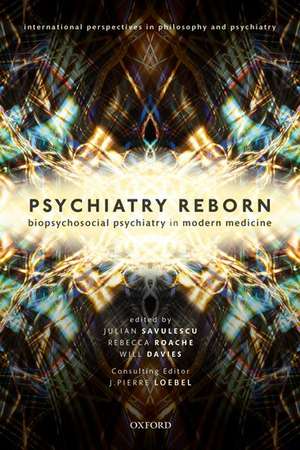Psychiatry Reborn: Biopsychosocial psychiatry in modern medicine: International Perspectives in Philosophy and Psychiatry
Editat de Julian Savulescu, Rebecca Roache, Will Davies J. Pierre Loebelen Limba Engleză Paperback – 21 oct 2020
Din seria International Perspectives in Philosophy and Psychiatry
- 19%
 Preț: 247.10 lei
Preț: 247.10 lei - 17%
 Preț: 344.27 lei
Preț: 344.27 lei - 27%
 Preț: 198.00 lei
Preț: 198.00 lei - 17%
 Preț: 442.18 lei
Preț: 442.18 lei - 23%
 Preț: 712.60 lei
Preț: 712.60 lei - 14%
 Preț: 286.51 lei
Preț: 286.51 lei - 18%
 Preț: 288.32 lei
Preț: 288.32 lei - 24%
 Preț: 271.73 lei
Preț: 271.73 lei - 16%
 Preț: 399.95 lei
Preț: 399.95 lei - 23%
 Preț: 476.13 lei
Preț: 476.13 lei - 23%
 Preț: 383.13 lei
Preț: 383.13 lei - 17%
 Preț: 506.06 lei
Preț: 506.06 lei - 17%
 Preț: 356.57 lei
Preț: 356.57 lei - 19%
 Preț: 417.10 lei
Preț: 417.10 lei - 17%
 Preț: 459.75 lei
Preț: 459.75 lei
Preț: 304.07 lei
Preț vechi: 343.18 lei
-11% Nou
Puncte Express: 456
Preț estimativ în valută:
58.20€ • 63.24$ • 48.92£
58.20€ • 63.24$ • 48.92£
Carte disponibilă
Livrare economică 19-25 martie
Preluare comenzi: 021 569.72.76
Specificații
ISBN-13: 9780198789697
ISBN-10: 0198789696
Pagini: 432
Dimensiuni: 156 x 235 x 22 mm
Greutate: 0.68 kg
Editura: OUP OXFORD
Colecția OUP Oxford
Seria International Perspectives in Philosophy and Psychiatry
Locul publicării:Oxford, United Kingdom
ISBN-10: 0198789696
Pagini: 432
Dimensiuni: 156 x 235 x 22 mm
Greutate: 0.68 kg
Editura: OUP OXFORD
Colecția OUP Oxford
Seria International Perspectives in Philosophy and Psychiatry
Locul publicării:Oxford, United Kingdom
Recenzii
This interesting book addresses various topics related to the so-called biopsychosocial (BPS) model of mental health ... fascinating ideas abound throughout.
Psychiatry Reborn is a serious and scholarly attempt at making sense of the fractured nature of psychiatry as a discipline. It does so by engaging with philosophical arguments as well as research studies, and it is a valuable book for psychiatrists, psychologists, and philosophers. It is particularly essential reading for students of the BPSM and pluralism in psychiatry, and will shape the discussion on how to best understand the BPSM for years to come.
Psychiatry Reborn is a serious and scholarly attempt at making sense of the fractured nature of psychiatry as a discipline. It does so by engaging with philosophical arguments as well as research studies, and it is a valuable book for psychiatrists, psychologists, and philosophers. It is particularly essential reading for students of the BPSM and pluralism in psychiatry, and will shape the discussion on how to best understand the BPSM for years to come.
Notă biografică
Professor Julian Savulescu has held the Uehiro Chair in Practical Ethics at the University of Oxford since 2002. He has degrees in medicine, neuroscience and bioethics. He directs the Oxford Uehiro Centre for Practical Ethics within the Faculty of Philosophy, and leads a Wellcome Trust Senior Investigator award on Responsibility and Health Care. He directs the Oxford Martin Programme for Collective Responsibility for Infectious Disease at the Oxford Martin School at the University of Oxford. He co-directs the interdisciplinary Wellcome Centre for Ethics and Humanities. He is a leader in medical and practical ethics, with more than 400 publications, an h index of 61 and over 14,315 citations in total. He spent 10 years as Editor of the Journal of Medical Ethics, the highest impact journal in the field, and is founding editor of Journal of Practical Ethics, an open access journal in Practical Ethics. Dr Rebecca Roache was educated at the universities of Leeds and Cambridge, and worked at the University of Oxford before moving to Royal Holloway in 2014. She writes on issues in ethics, language, and psychiatry, and frequently appears in the media. She is currently writing a book on the philosophy of swearing for OUP.Dr Will Davies is a lecturer in Philosophy at the University of Birmingham, specialising in the Philosophy of Psychology and Psychiatry. He completed his BPhil and DPhil at Balliol College, Oxford, where he was a Jowett Senior Scholar, and then held a Junior Research Fellowship at Churchill College, Cambridge before joining the faculty at Birmingham in 2017. Dr Davies has published articles in journals such as Analysis, Philosophical Studies, British Journal for the Philosophy of Science, and Philosophy of Science. He is currently PI of a British Academy/Leverhulme grant on Colour and Form in the Disordered Mind.Professor J. Pierre Loebel was born in Romania, schooled in Palestine and England, studied philosophy and experimental psychology at Oxford University, followed by medical school in South Africa, and psychiatry at The Bethlem Royal and Maudsley Hospitals, London. Influenced by the teaching and training of Alwyn Lishman, Michael Shepherd, and Isaac Marks and influenced by their wide ranging patient formulations, he developed his interest in bio-psychosocially oriented clinical practice. Specializing in geriatric psychiatry and team based care in Long Term Care institutions, he moved after some years into private practice using the full range of bio-psychosocially oriented evaluation and treatment modalities, in tune with the aphorism ascribed to Hippocrates that "It is insufficient to understand the nature of the illness that the patient has, but also necessary to understand the nature of the patient that the illness has."
